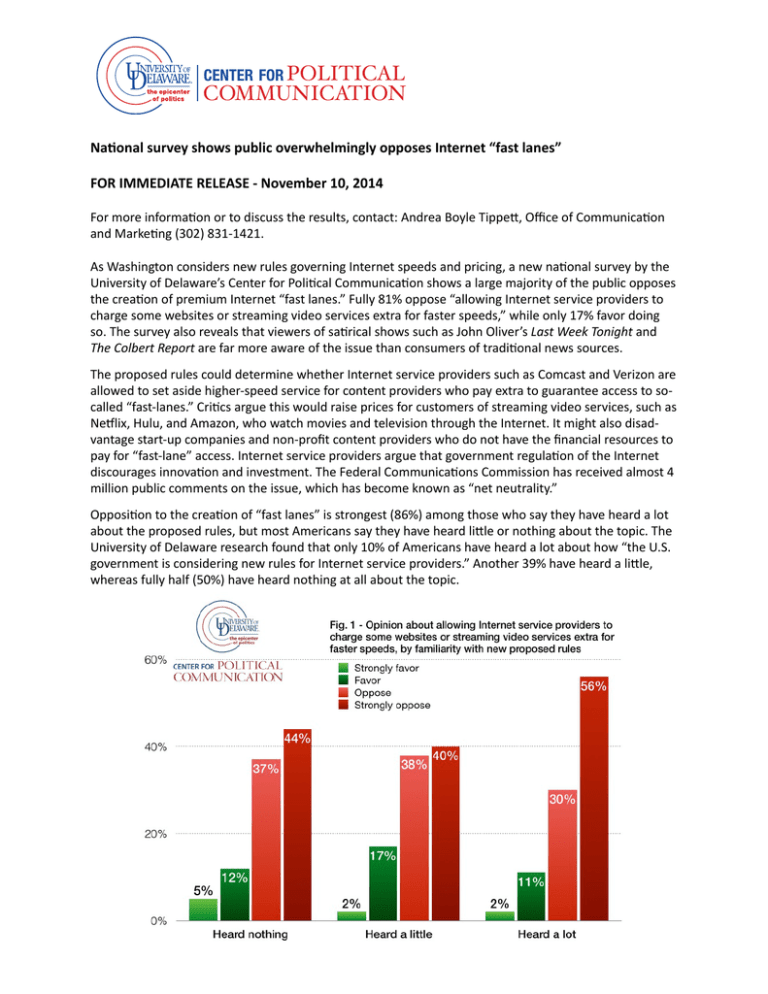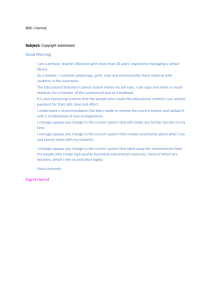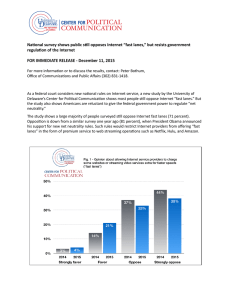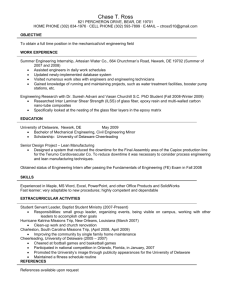Document 10439256
advertisement

CENTER FOR CENTER FOR !"#$%$&'# &"(()*$&'%$"* Na#onal survey shows public overwhelmingly opposes Internet “fast lanes” FOR IMMEDIATE RELEASE -­‐ November 10, 2014 For more informa+on or to discuss the results, contact: Andrea Boyle Tippe:, Office of Communica+on and Marke+ng (302) 831-­‐1421. As Washington considers new rules governing Internet speeds and pricing, a new na+onal survey by the University of Delaware’s Center for Poli+cal Communica+on shows a large majority of the public opposes the crea+on of premium Internet “fast lanes.” Fully 81% oppose “allowing Internet service providers to charge some websites or streaming video services extra for faster speeds,” while only 17% favor doing so. The survey also reveals that viewers of sa+rical shows such as John Oliver’s Last Week Tonight and The Colbert Report are far more aware of the issue than consumers of tradi+onal news sources. The proposed rules could determine whether Internet service providers such as Comcast and Verizon are allowed to set aside higher-­‐speed service for content providers who pay extra to guarantee access to so-­‐ called “fast-­‐lanes.” Cri+cs argue this would raise prices for customers of streaming video services, such as Ne^lix, Hulu, and Amazon, who watch movies and television through the Internet. It might also disad-­‐ vantage start-­‐up companies and non-­‐profit content providers who do not have the financial resources to pay for “fast-­‐lane” access. Internet service providers argue that government regula+on of the Internet discourages innova+on and investment. The Federal Communica+ons Commission has received almost 4 million public comments on the issue, which has become known as “net neutrality.” Opposi+on to the crea+on of “fast lanes” is strongest (86%) among those who say they have heard a lot about the proposed rules, but most Americans say they have heard li:le or nothing about the topic. The University of Delaware research found that only 10% of Americans have heard a lot about how “the U.S. government is considering new rules for Internet service providers.” Another 39% have heard a li:le, whereas fully half (50%) have heard nothing at all about the topic. University of Delaware | Elliott Hall | 26 East Main Street | Newark, DE 19716 | www.udel.edu/epicenter CENTER FOR POLITICAL COMMUNICATION page "2 University of Delaware The research suggests sa+re programs can have a significant – and long-­‐las+ng – impact on public con-­‐ sciousness about an important public policy issue receiving li:le coverage in conven+onal news media. Among those who regularly or some+mes watch Last Week Tonight with John Oliver, an HBO comedy program that produced a widely viewed segment on net neutrality this summer, 29% say they have heard a lot about the proposed rules—almost three +mes greater than the level reported by the public as a whole. Among those who regularly or some+mes watch The Colbert Report, a Comedy Central pro-­‐ gram that also covered net neutrality earlier this year, 23% say they have heard a lot. By contrast, famil-­‐ iarity with the issue is much lower among those regularly or some+mes following tradi+onal news me-­‐ dia, including newspapers (12%), CNN (11%), MSNBC (11%), the broadcast evening news programs on ABC, CBS, or NBC (9%), and Fox News (7%). (more) CENTER FOR POLITICAL COMMUNICATION page "3 University of Delaware Americans who use a streaming video service are much more likely than non-­‐users to have heard about the proposed rules. Among streaming video service users, 17% say they have heard a lot about the topic and another 43% have heard a li:le. Among non-­‐users, only 6% have heard a lot and another 37% have heard a li:le. The telephone survey of 900 U.S. adults was conducted by the University of Delaware’s Center for Poli+-­‐ cal Communica+on from October 21-­‐26, 2014. CPC Associate Director Paul Brewer supervised the study. About the study The Na+onal Agenda Opinion Project research was funded by the University of Delaware’s Center for Poli+cal Communica+on (CPC) and the William P. Frank Founda+on. The study was supervised by the CPC’s Associate Director, Paul Brewer, a professor in the Departments of Communica+on and Poli+cal Science & Interna+onal Rela+ons. Results are based on telephone interviews with a representa+ve sample of 900 adult U.S. residents. Telephone interviews were conducted via landline (n=450) and cell phone (n=450, including 243 without a landline phone). The survey was conducted under supervision of the Center for Poli+cal Communica-­‐ +on by Princeton Survey Research Associates Interna+onal, and the interviews were administered in English by Princeton Data Source. The data were collected from October 21-­‐26, 2014. Sta+s+cal results are weighted to correct known demographic discrepancies. The margin of sampling error for the com-­‐ plete set of weighted data is ± 3.2 percentage points. Readers should be aware that in addi+on to sampling error, ques+on wording and prac+cal difficul+es in conduc+ng surveys can introduce error or bias into the findings of public opinion polls. Please contact Paul Brewer at (302) 831-­‐7771 for more details about the survey’s methodology. CENTER FOR POLITICAL COMMUNICATION page "4 University of Delaware UNIVERSITY OF DELAWARE CENTER FOR POLITICAL COMMUNICATION OCTOBER 2014 NATIONAL AGENDA POLL FINAL TOPLINE October 21-­‐26, 2014 N =900 U.S. Adult Residents The U.S. government is considering new rules for Internet service providers... [Some people call this is-­‐ sue NET NEUTRALITY.] How much, if anything, have you heard about this—a lot, a li:le, or nothing at all? Ques+on did not men+on “net neutrality” (N = 441) Ques+on did men+on “net neutrality” (N = 459) A lot 12% 9% A li:le 42% 37% Nothing at all 46% 54% TOTAL 100% 100% Please tell me how strongly you FAVOR or OPPOSE each of the following: Allowing Internet service providers to charge some websites or streaming video services extra for faster speeds—do you strongly favor, favor, oppose, or strongly oppose this? Strongly favor 3% Favor 14% Oppose 37% Strongly oppose 44% Don’t know/refused (volunteered) 3% TOTAL Note: Not all columns sum to 100% due to rounding. 100% CENTER FOR POLITICAL COMMUNICATION page "5 University of Delaware Detailed Demographic Tables The U.S. government is considering new rules for Internet service providers... [Some people call this is-­‐ sue NET NEUTRALITY.] How much, if anything, have you heard about this—a lot, a li:le, or nothing at all? Nothing at all A li:le A lot ALL RESPONDENTS 50% 39% 10% Women 52% 42% 7% Men 49% 37% 15% 18-­‐24 years of age 53% 39% 8% 25-­‐34 years of age 60% 27% 13% 35-­‐44 years of age 54% 35% 11% 45-­‐54 years of age 45% 46% 9% 55-­‐64 years of age 40% 48% 13% 65+ years of age 52% 42% 6% High school or less 59% 34% 7% Some college 48% 43% 10% College degree + 40% 44% 16% White 50% 40% 11% African American 49% 44% 7% Hispanic 57% 36% 7% Other 51% 32% 17% Republican 51% 43% 6% Democrat 45% 41% 14% Independent 53% 35% 12% Note: Not all columns sum to 100% due to rounding. CENTER FOR POLITICAL COMMUNICATION page "6 University of Delaware Please tell me how strongly you FAVOR or OPPOSE each of the following: Allowing Internet service providers to charge some websites or streaming video services extra for faster speeds—do you strongly favor, favor, oppose, or strongly oppose this? Strongly favor Favor Oppose Strongly Oppose Don’t know/ Refused ALL RESPONDENTS 3 14 37 44 3 Women 4 15 36 43 3 Men 3 13 37 44 3 18-­‐24 years of age 5 15 31 50 0 25-­‐34 years of age 6 15 34 44 1 35-­‐44 years of age 2 13 36 48 1 45-­‐54 years of age 3 16 30 46 4 55-­‐64 years of age 3 14 40 38 6 65+ years of age 0 10 50 33 7 High school or less 4 13 35 45 3 Some college 4 11 38 45 2 College degree + 1 17 37 40 4 White 2 14 36 45 3 African American 5 14 41 36 5 Hispanic 6 12 33 48 1 Other 7 12 41 36 3 Republican 2 11 44 41 1 Democrat 2 13 34 47 4 Independent 4 17 31 45 3 Note: Not all columns sum to 100% due to rounding.



